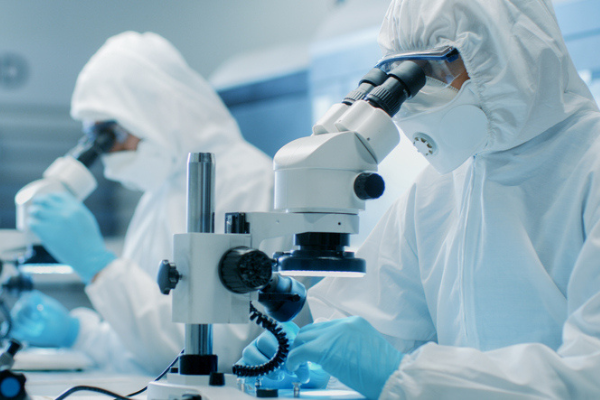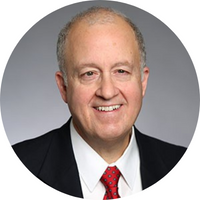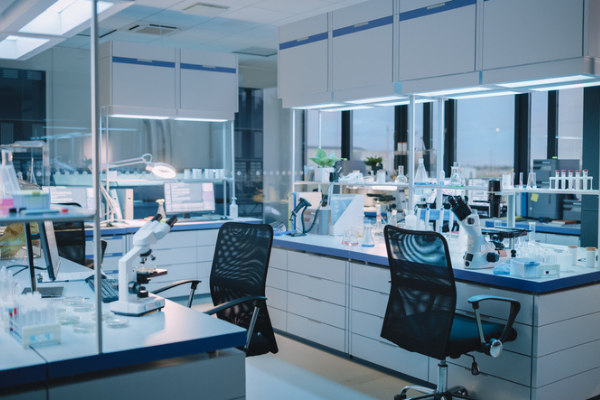
You spent part of your career at Nalco as a chemical hygiene officer. What were your primary responsibilities?
The main responsibility of a CHO is to ensure compliance with the OSHA Lab Standard. My first task was to prepare the company’s chemical hygiene plan (CHP). All U.S. employees who work in a laboratory must be trained about their CHP. Once established as the designated lab safety person, I was involved in safety training and support for our researchers all over the world. That assignment took me to at least nine countries on five continents over nineteen years.
If you were still working at Nalco, what sort of issues would have been crossing your mind when it came to making plans to re-open company labs? Which of the recommended control practices (social distancing, wearing face masks, washing hands frequently) are likely to be permanent or at least long-term?
Microbiologists and biological chemists can help us understand contamination challenges. Disinfecting shared equipment, books, and surfaces would require training and discipline. Speaking while wearing a facemask would take some practice. Some experiments may require close contact of more than one researcher.
Generally speaking, what impact on lab operations would you expect from having to implement accommodations for COVID-19?
Distancing may lead to individual (i.e., not shared) workspaces. If the virus cannot be eliminated or contained, then every individual is a potential carrier of the virus. This concept is not entirely new for chemists. Most of us have been told that we should treat every unknown chemical as if it were hazardous until we know it is safe. Those who have received training for bloodborne pathogens were taught to assume that all blood should be assumed to be infected. The social nature of our jobs will need extensive modification in activities such as meetings, meals, travel, emergency response, and visitors.
Which sector is ‘doing’ lab safety best? Industry, academia or government?
All sectors have improved since I started as a chemical hygiene officer. Industry seems to adapt more quickly to minimize the risk of new hazards. Managers understand the personal and financial costs of an incident to the organization. Companies also want to avoid fines and litigation. Academia has more layers of administration, and some of the administrators are not scientists. But there has been an impressive demand from graduate students for more safety education. In general, faculty members are responding positively in creating a stronger safety culture in their groups and departments. Government labs have always had the greatest number of safety support staff. They take the lead in documenting and thoroughly updating safety policies and procedures. I have wondered how the bench scientists keep up with the details. Of course, scientists in the regulatory agencies play a crucial role in establishing regulations and guidelines regarding health and safety in the workplace.
What can academia do to better prepare students for careers in industry?
With respect to safety, the most important task is to create a positive safety culture. Students must understand and believe that safety is an essential component of chemistry. Topics that should be familiar are: emergency response, personal protective equipment (PPE), hazard communication, job hazard analysis, lab waste disposal, and scale-up issues. The more of these topics covered during education, the better. In a more general view, written and oral communication skills, teamwork/collaboration, and creative thinking will make the transition to industry easier.
How did your parents influence your leadership style?
My parents were young adults during the Great Depression. They taught me, by word and example, about the need to be self-sufficient and financially independent. They strongly encouraged higher education, although we were expected to pay for our education.
What’s the one personality trait that was responsible for your career success?
I care about my colleagues, and that is why their personal safety is important to me. I want them to get home safely each night and someday retire in reasonably good health. I view myself as a safety resource, not an enforcer. I strive to make safety education relevant and somewhat entertaining.
To what - or to whom - do you credit your strong writing skills?
Lots of practice! In high school, we had to write weekly essays in English class. Nalco required regular reports, proposals, evaluations, and lab audits. I was co-author of The Last Word column in The Journal of Chemical Health & Safety for fourteen years. I am probably a better editor than a writer of first drafts, and I edit my writing extensively.
It’s 2040. What is providing humanity with its greatest challenge? Access to food? Water? Energy? Clean air? Something else?
All of the topics mentioned are aspects of climate change. In developed countries, the public does not recognize the growing crisis in our dwindling supply of fresh water. Chemists have made major scientific and technical contributions that make our lives safer, healthier, and more comfortable. We also understand many of the challenges we now face. Industrial companies try to focus on solutions to specific problems. Could we develop affordable replacements for non-degradable single-use materials that are making their way to our oceans and landfills? I believe we can.
You were a member of the 2011 ACS Fellows class. What significance do you attach to that honor?
I was nominated by the Committee on Chemical Safety (CCS). I had just completed a total of ten years’ service to the committee, a year as an Associate Member and nine years as a Member (including three years as Chair). It was the first major recognition by ACS of my contributions to chemical safety and the Society. I am honored to have been selected as a Fellow. I have supported nominations of several qualified ACS members to be ACS Fellows.
You have spent decades supporting ACS through it Sections, Committees, Divisions, and more. What’s the most pressing challenge confronting ACS in 2020?
ACS members have been supporting me for decades! The Division of Chemical Health and Safety and the Committee on Chemical Safety have been my most significant sources of foundational and continuing safety education. The biggest challenge for ACS is to meet the personal and professional needs of every member: students, new graduates, industrial chemists, academic chemists, government chemists, international chemists, chemical consultants, mid-career chemists, non-traditional career chemists, retired chemists.
What complicates this challenge is that the needs change as our situations change. Currently, we are battling a pandemic which threatens our lives and has severely depressed our economy. Millions of people in all occupations have been furloughed or laid off. Will those jobs return? Will the nature of our jobs change? Is working from home going to be a normal condition? What happens in our labs? What can ACS offer such that each member decides that Society membership is worth the dues?
Not counting family, who is the one person – alive or dead – you would most want to have dinner with? What would you talk about?
I would like to have dinner with Jesus Christ, asking about issues not mentioned in the gospels. Some of those issues would be: climate change; poverty and income inequality; and women’s rights. Like his disciples and followers, I probably would not completely understand or fully appreciate his answers. A good second choice would be Abraham Lincoln; I would ask how a divided country reunites. I suspect that the honest and very humble President Lincoln would say that a dinner with Jesus would be more interesting.

Ken Fivizzani retired in 2009 as a Research Scientist at Nalco Company (now part of Ecolab) following a twenty-six year career. He was the Chemical Hygiene Officer for Nalco’s Naperville (IL) and Sugar Land (TX) Research Laboratories from 1990 to 2009. He received both BS and MS degrees in chemistry from Loyola University Chicago and a PhD in inorganic chemistry from the University of Wisconsin-Madison. [He also has a degree in theology from the University of St. Mary of the Lake.]
He has served as Chair for the ACS Division of Chemical Health and Safety (CHAS). He received both the Tillmanns-Skolnik Award and the Lifetime Achievement Award from CHAS. He is a past Chair and member of the ACS Committee on Chemical Safety (CCS). He is a current member of the ACS Committee on Community Activities (CCA). He has served as Chair of the ACS Chicago Section, and he is currently a Councilor for the section. He received the Chemistry Alumni of the Year Award from Loyola University Chicago; he was inducted into the Nalco Inventors’ Hall of Fame (5 US Patents).
[In 2008, he served as a member of the NIST Blue Ribbon Commission on Management and Safety that reported its findings to the U.S. Secretary of Commerce.] He served on the National Academies’ Committee that prepared the updated Prudent Practices in the Laboratory: Handling and Management of Chemical Hazards (2011). [In 2013, he was a chemical safety consultant for the College of Chemistry at the University of California, Berkeley. Fivizzani was certified as a Chemical Hygiene Officer by the National Registry of Certified Chemists. He served on the Board of Editors of The Journal of Chemical Health & Safety and has written columns for The Last Word in that journal.] He has presented fifty-three papers at national ACS meetings.
The opinions expressed in this article are the author's own and do not necessarily reflect the view of their employer or the American Chemical Society.
Copyright 2020 American Chemical Society (All Rights Reserved)








